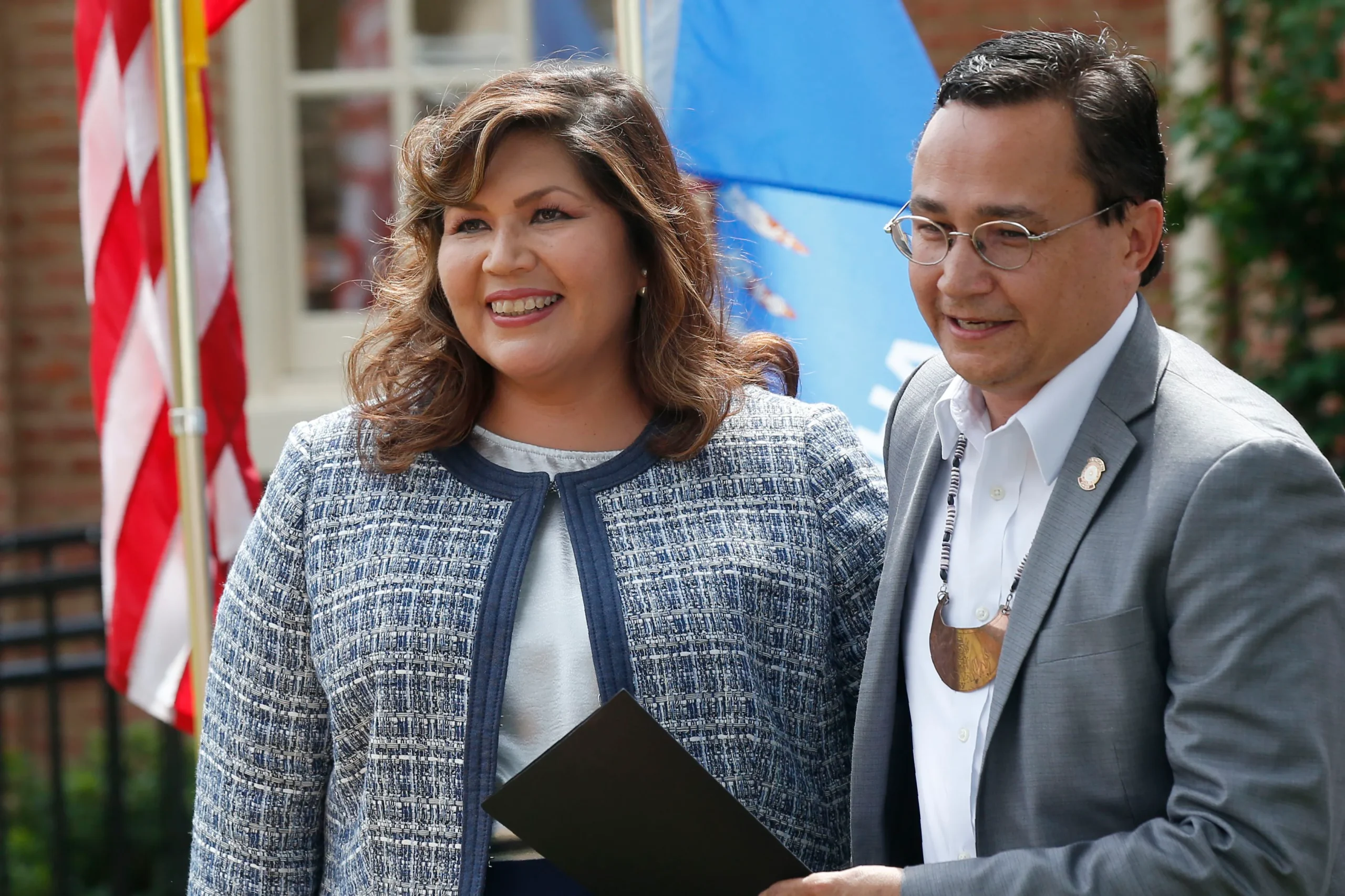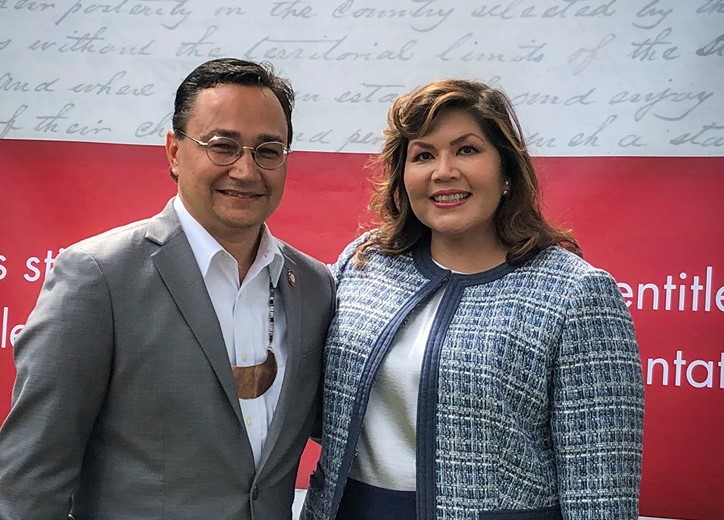Main Highlights:
- John Ross, the chief of the Cherokee Nation, had to guide a people that were suffering from the effects of forced eviction in the years after the Treaty of New Echota was ratified in 1835.
- Nearly 200 years after the Treaty of New Echota was signed, the Cherokee Nation is attempting to resurrect one of the few benefits that its forefathers were able to obtain: the guarantee of congressional representation.
- According to a senior Democratic source, the Committee on House Administration gave the Congressional Research Service a mandate to investigate the matter last year.
- Teehee Rosser of the Cherokee Nation said, “You can’t accept the treaty when it’s convenient for you. If they try to undermine the legitimacy of this treaty.”
John Ross, the chief of the Cherokee Nation, had to guide a people that were suffering from the effects of forced eviction in the years after the Treaty of New Echota was ratified in 1835. The Trail of Tears, which the Cherokee people marched through between 1837 and 1839, was a result of the treaty, which saw the U.S. government pay $5 million for almost seven million acres of their ancestral territories east of the Mississippi River.
Approximately 16,000 Cherokees were rounded up and escorted by federal troops in the fall of 1838 in preparation for a four-month journey to what is now Oklahoma. During this time, one in four emigrants perished from malnutrition, disease, starvation, and even physical exhaustion from battling the harsh winter conditions.
Nearly 200 years after the Treaty of New Echota was signed, the Cherokee Nation is attempting to resurrect one of the few benefits that its forefathers were able to obtain: the guarantee of congressional representation.
Principal Chief Chuck Hoskin Jr., who retains the same leadership position dating back to Ross, says “so many of my predecessors were attempting to rebuild the Nation or keep us from disintegrating in the face of severe tyranny and huge challenges.”
The treaty states that the Cherokee Nation “shall be entitled to a delegate in the House of Representatives in the United States whenever Congress should make provision for the same,” which was written after Andrew Jackson’s Indian Removal Act. A lesser-known trust duty was dormant until Hoskin chose Kimberly Teehee to represent the Nation three years ago, although having received no formal approval from the House to do so.

Democrats are concerned about losing control of the House after the 2022 midterm elections.
The Nation and its leaders are hoping that legislators would address their complaints in the remaining months of the current session.
She has faith that Congress would move quickly during the lame-duck session that will take place after the November elections, at least in terms of scheduling a House hearing to determine whether the Cherokee Nation should have a delegate. The post would then be formally established with a simple House majority vote.
According to Teehee, there are several well-known House representatives on both sides of the aisle who are regarded as advocates of Indian Country. She singled Alaska’s freshly elected Yup’ik representative Mary Peltola and Native Hawaiian Kai Kahele as examples of Democrats.
Representative Tom Cole, a Chickasaw Nation of Oklahoma member and co-chair of the Congressional Native American Caucus, represents the Republicans.
For the first time, an Alaska Native, Native Hawaiian, and Native American are all House representatives thanks to Peltola’s historic victory in a special election in September. Although it’s a notable accomplishment, Peltola realizes that there are still many challenges to be solved in Indian Country before she can run for reelection in November.
Each of the following jurisdictions has a non-voting representative: Puerto Rico, American Samoa, Guam, the District of Columbia, the Northern Mariana Islands, and the U.S. Virgin Islands.

When it comes to making choices, and creating laws and regulations that impact us, Teehee would not be able to participate in any House votes they can, but she still finds value in getting “a place at the table where only a few sit.” By establishing a permanent Indigenous presence on Capitol Hill, her interests would extend beyond Cherokees to include the entirety of Indian Country.
The requirements of Indian Country are entirely on the shoulders of the few champions that the country now has in Congress, according to Teehee. “But undoubtedly, the problems that affect tribes everywhere are the same. I firmly believe that the Cherokee Nation representative has the chance to represent all tribes, and that is not unusual.
Only one other treaty conceivably grants a second tribe the right to congressional representation, making the Cherokee Nation a significant oddity. In addition to the agreements made with the Cherokee Nation, David Wilkins, a former student of Vine Deloria Jr. and current professor at the University of Richmond, believes two other treaties specifically include tribal rights to delegate representation.
The Treaty of Dancing Rabbit Creek, signed by the Choctaw Nation of Oklahoma in 1830, contained forward-looking language that asked for “the privilege of a Delegate on the floor of the House of Representatives extended to them,” but Congress ultimately “decided the application” and denied the request.

Wilkins remarks, “I have wondered why the Choctaw haven’t pushed it more regularly, especially now that the Cherokee is getting all this attention over their delegate provision.
Even with the treaty’s dubious past and the Cherokee Nation’s alliance with the Confederacy after the latter’s separation from the Union, their rights were unaffected. Despite the end of the Civil War, the United States never revoked the Treaty of New Echota.
According to a senior Democratic source, the Committee on House Administration gave the Congressional Research Service a mandate to investigate the matter last year. The study’s conclusions were published in a report explaining that complex history in July. According to Teehee, the analysis “affirms that the treaty right is still alive and in existence, but never abrogated.”
The Choctaw, Chickasaw, Creek, Seminole, and Cherokee treaty’s delegate clause as well as the recent McGirt v. Oklahoma ruling by the Supreme Court, which determined that the Muscogee Creek Nation’s reservation’s eastern lands were never disestablished, have increased the state’s Five Civilized Tribes’ political clout.
Teehee Rosser of the Cherokee Nation said, “You can’t accept the treaty when it’s convenient for you. If they try to undermine the legitimacy of this treaty.” According to Ryan Seelau, policy lead for legal and governance at the National Congress of American Indians, the organisation is still dedicated to its goal.
According to him, NCAI “completely supports the exercise of tribal treaty rights.” “NCAI continues to call upon the House of Representatives to fulfil its responsibilities,” says Ryan Seelau, policy lead for legal and governance, adding that “NCAI strongly supports the exercise of tribal treaty rights.”
Seelau claims that because NCAI issued a resolution immediately after Teehee’s appointment, applicable to all rights for delegate representation, “including, but not limited to, the Cherokee Nation,” it has maintained its official position.
The chairman of the Cherokee Nation Tribal David Teehee says, “We recognize that all of the efforts we’re doing now take place against a backdrop of decades of failed promises, but I’m confident that we’re in a different age.”








